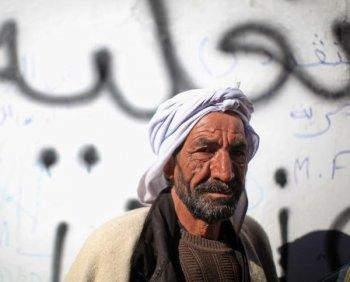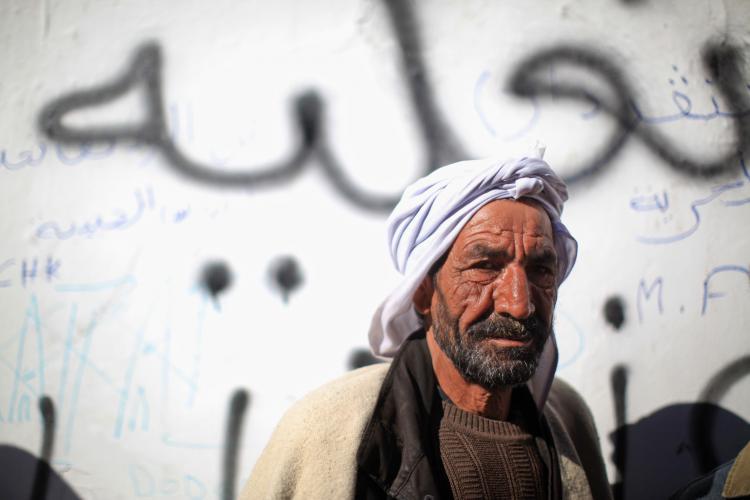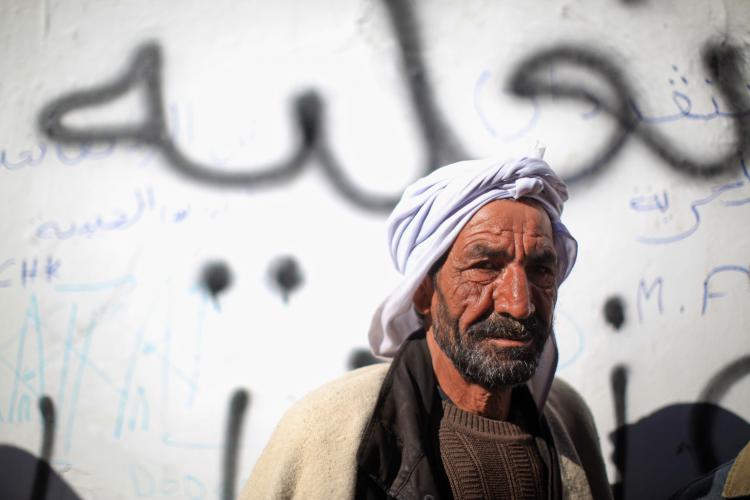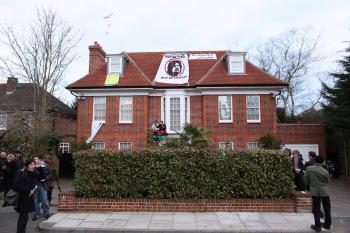While democracy may be a rare sight in the Arab world, it is not impossible, and Tunisia could lead the way there, experts say.
As Tunisians come to terms with the implications of the Jasmine Revolution earlier this month that sent strongman Zine el Abidine Ben Ali into exile after 23 years in power, it is counting its chances for democracy.
While countries like Lebanon, Egypt, and Iraq already have multiparty elections, that modicum of electoral choice is currently the extent of democracy in the region. But Tunisia may spell a change.
“Tunisia has the chance to become the first real democratic Arab country,” wrote Noomane Raboudi in an e-mail from the University of Ottawa.
According to Raboudi, the conditions look promising. Tunisia has a homogeneous, cohesive, well-educated population willing to participate in a free electoral process. In Tunisia women have had equal rights to men since the 1950s. The military has been supportive of the Jasmine Revolution, with Gen. Rachid Ammar, Tunisia’s highest military leader, announcing his support on Jan. 24.
“The majority of the population—after decades of suppression and political repression … Tunisians are hungry to participate in a free and democratic electoral process,” says Raboudi.
While Tunisia has a relatively moderate Muslim population compared to other Arab countries like Saudi Arabia or Egypt, getting everyone on board for democracy could pose a challenge.
The main challenge for Muslims is that they may believe that the ideas and principles of democracy are incompatible with the values of the Islam, says Radwan Masmoudi, president and founder of the Center for the Study of Islam and Democracy in Washington.
Some people in the Muslim world believe that “democracy is government by the people and Islam says you have to follow the rule of God,” says Masmoudi.
Masmoudi seeks to demonstrate to the 10 percent of Tunisians who according to him perceive the combination as a problem, that “you can be Muslim and democrat at the same time.”
He explains to them that God created the earth, and on earth mankind is sovereign. It is here we can discuss whom we want for a leader and hold them accountable. Masmoudi says democracy is “a system that works to solve political conflicts with peaceful means.”
According to Masmoudi, the Islamic law, Sharia, has developed over centuries and is not fixed in time and that based on circumstances, new interpretations can arise. “We are not obligated to follow the interpretations of the people that came before us.” Masmoudi says.
Next: Interim Government
Weeks of protests in Tunisia saw the 23-year rule of President Ben Ali shatter. He and his wife have fled to Saudi Arabia. To meet demands of the protesters, the political party he left behind made a series of conciliatory gestures.
On Jan. 17, a temporary national unity government was created, which includes for the first time representatives of officially recognized opposition parties. But it doesn’t yet include opposition parties that were critical of the former government and deemed illegal under Ben Ali’s rule.
The unity government is tasked with preparing the country for its first free elections since Tunisia’s independence from France in 1956. In a bid to gain the trust of the people and build credibility, the unity government has taken steps to confiscate the assets of Ben Ali and his relatives and has launched an investigation into embezzlement and corruption by the former president.
“Opening up space for political parties, beginning a dialogue with civil society, releasing prisoners, opening up space for free media to cover ongoing events—these are positive steps,” said U.S. State Department spokesman Phillip Crowley regarding recent developments in Tunisia.
While the unity government has received support for its march to democratic elections from Western countries like France and Germany, protesters have a different view.
They are continuing to call for the complete removal of all politicians belonging to Ben Ali’s Constitutional Democratic Rally (RCD) party or those who have served under his rule.
“The demonstrators have been really clear that they don’t accept the ruling party, the RCD, and that they don’t really want a government that has anyone of the RCD in it,” says Eugene Rogan, a professor of modern history of the Middle East at Oxford University.
According to Rogan, the biggest challenge is how to encourage the demonstrators to turn to an institutional way to express their wishes.
What’s needed in Tunisia, according to Rogan, is for the “demonstrators to come together and make parties or for exiled parties to return and get involved in free and open politics in Tunisia.” This includes learning how to participate in a political arena and learning the skills needed in a democracy.
Rogan says autocrats and dictators have tried to prevent people from questioning their control over politics for decades. “That is what the Arab world has to overcome now,” he says.
The interim government says elections will be held within six months, and in that time there is much work to be done. Although Tunisia has six official opposition parties, they exist in name only, having been formally approved under Ben Ali’s rule. The opposition parties that were previously banned will need the six-month ramp up time to establish organizational structures and campaign plans.
Masmoudi says in these crucial six months Tunisians don’t have the luxury of time to invent things themselves and have to learn from international organizations specialized in helping countries prepare for their first free and fair elections.
Masmoudi, who left Tunisia in 1981, said he has been training hundreds of Tunisians in their country during the past three years, through conferences and workshops in how to be democratic citizens. Tunisians need to learn how to be involved in political and social life, and how to exercise their rights, Masmoudi said. He will be returning to Tunisia this week.
The United States is also helping the process. Assistant Secretary for Near Eastern Affairs Jeff Feltman is currently in Tunisia assessing where the United States and nongovernment organizations can assist.
A credible outcome in the upcoming elections will be crucial for Tunisia to continue on a path toward democracy, says Masmoudi, and in bolstering hope for people in other dictatorships who are watching the process very closely.
As Tunisians come to terms with the implications of the Jasmine Revolution earlier this month that sent strongman Zine el Abidine Ben Ali into exile after 23 years in power, it is counting its chances for democracy.
While countries like Lebanon, Egypt, and Iraq already have multiparty elections, that modicum of electoral choice is currently the extent of democracy in the region. But Tunisia may spell a change.
“Tunisia has the chance to become the first real democratic Arab country,” wrote Noomane Raboudi in an e-mail from the University of Ottawa.
According to Raboudi, the conditions look promising. Tunisia has a homogeneous, cohesive, well-educated population willing to participate in a free electoral process. In Tunisia women have had equal rights to men since the 1950s. The military has been supportive of the Jasmine Revolution, with Gen. Rachid Ammar, Tunisia’s highest military leader, announcing his support on Jan. 24.
“The majority of the population—after decades of suppression and political repression … Tunisians are hungry to participate in a free and democratic electoral process,” says Raboudi.
Getting Muslims On-board for Democracy
While Tunisia has a relatively moderate Muslim population compared to other Arab countries like Saudi Arabia or Egypt, getting everyone on board for democracy could pose a challenge.
The main challenge for Muslims is that they may believe that the ideas and principles of democracy are incompatible with the values of the Islam, says Radwan Masmoudi, president and founder of the Center for the Study of Islam and Democracy in Washington.
Some people in the Muslim world believe that “democracy is government by the people and Islam says you have to follow the rule of God,” says Masmoudi.
Masmoudi seeks to demonstrate to the 10 percent of Tunisians who according to him perceive the combination as a problem, that “you can be Muslim and democrat at the same time.”
He explains to them that God created the earth, and on earth mankind is sovereign. It is here we can discuss whom we want for a leader and hold them accountable. Masmoudi says democracy is “a system that works to solve political conflicts with peaceful means.”
According to Masmoudi, the Islamic law, Sharia, has developed over centuries and is not fixed in time and that based on circumstances, new interpretations can arise. “We are not obligated to follow the interpretations of the people that came before us.” Masmoudi says.
Next: Interim Government
Interim Government
Weeks of protests in Tunisia saw the 23-year rule of President Ben Ali shatter. He and his wife have fled to Saudi Arabia. To meet demands of the protesters, the political party he left behind made a series of conciliatory gestures.
On Jan. 17, a temporary national unity government was created, which includes for the first time representatives of officially recognized opposition parties. But it doesn’t yet include opposition parties that were critical of the former government and deemed illegal under Ben Ali’s rule.
The unity government is tasked with preparing the country for its first free elections since Tunisia’s independence from France in 1956. In a bid to gain the trust of the people and build credibility, the unity government has taken steps to confiscate the assets of Ben Ali and his relatives and has launched an investigation into embezzlement and corruption by the former president.
“Opening up space for political parties, beginning a dialogue with civil society, releasing prisoners, opening up space for free media to cover ongoing events—these are positive steps,” said U.S. State Department spokesman Phillip Crowley regarding recent developments in Tunisia.
While the unity government has received support for its march to democratic elections from Western countries like France and Germany, protesters have a different view.
They are continuing to call for the complete removal of all politicians belonging to Ben Ali’s Constitutional Democratic Rally (RCD) party or those who have served under his rule.
“The demonstrators have been really clear that they don’t accept the ruling party, the RCD, and that they don’t really want a government that has anyone of the RCD in it,” says Eugene Rogan, a professor of modern history of the Middle East at Oxford University.
Challenges ahead
According to Rogan, the biggest challenge is how to encourage the demonstrators to turn to an institutional way to express their wishes.
What’s needed in Tunisia, according to Rogan, is for the “demonstrators to come together and make parties or for exiled parties to return and get involved in free and open politics in Tunisia.” This includes learning how to participate in a political arena and learning the skills needed in a democracy.
Rogan says autocrats and dictators have tried to prevent people from questioning their control over politics for decades. “That is what the Arab world has to overcome now,” he says.
The interim government says elections will be held within six months, and in that time there is much work to be done. Although Tunisia has six official opposition parties, they exist in name only, having been formally approved under Ben Ali’s rule. The opposition parties that were previously banned will need the six-month ramp up time to establish organizational structures and campaign plans.
Masmoudi says in these crucial six months Tunisians don’t have the luxury of time to invent things themselves and have to learn from international organizations specialized in helping countries prepare for their first free and fair elections.
Masmoudi, who left Tunisia in 1981, said he has been training hundreds of Tunisians in their country during the past three years, through conferences and workshops in how to be democratic citizens. Tunisians need to learn how to be involved in political and social life, and how to exercise their rights, Masmoudi said. He will be returning to Tunisia this week.
The United States is also helping the process. Assistant Secretary for Near Eastern Affairs Jeff Feltman is currently in Tunisia assessing where the United States and nongovernment organizations can assist.
A credible outcome in the upcoming elections will be crucial for Tunisia to continue on a path toward democracy, says Masmoudi, and in bolstering hope for people in other dictatorships who are watching the process very closely.




